With July comes a lot of new experiences, really hot weather, and a new season of anime. Like I mentioned in my previous post, I’ve started gravitating towards other mediums and lessened my seasonal anime intake to things that I think are worth my time, and this season isn’t exactly an exception, with just Oshi no Ko and Monogatari capturing my interest. Which hey, I’ll take.
July’s been an eventful month for me, with many emotional bumps and events (I went to an anime convention, which was fun). But, as of writing this at the start of August, I think I’m feeling good about myself and the future. I’ve been able to learn many things about myself as a result of hardships, and I think I’m finally starting to really believe in myself. It’s a process, like many other things, but even if I’m not completely there, the journey is something I can take a bit of comfort in.
Anyway, let’s get into my month in June.
I have a bit of an unusual piece to start off with this time, the JPop song Recommended Girl by HoneyWorks. Well, reviewing songs weren’t completely unexpected, as I’ve always thought that these posts would contain anything within the month that would resonate with me to some degree, regardless of the art form or medium. Honeyworks songs never struck me as particularly profound, but they rarely ever try to be. They’re often celebrations of the smaller joys in life, leaning more on the side of self-love and empowerment rather than over confidence or narcissism. This song actually came out at the end of last year, but what prompted me to watch it was the release of a new version of the song with Sora Amamiya singing it, who happens to be one of my favorite voice actors.
While Honeyworks do tend to make the occasional melancholic song, Recommended Girl was particularly drenched in regret, familial love, and hopes for the future. As an older sibling myself, the song ended up being more personal than I expected, dredging up a lot of thoughts and memories about my own relationship with my younger sister. I wasn’t always the best older sibling, and like the song leads off with, I didn’t really understand a lot of things back then. While our relationship isn’t exactly terrible, there’s many lingering frictions from our past that make things more complicated than either of us would likely hope. My younger sister isn’t trying to be an idol like the song depicts but I like to think I’d be supporting her all the same, regardless of the dream she’s chasing. I’m still figuring a lot of things out myself, but I have hope that one day we’ll be able to reconcile our pasts and come to an understanding.
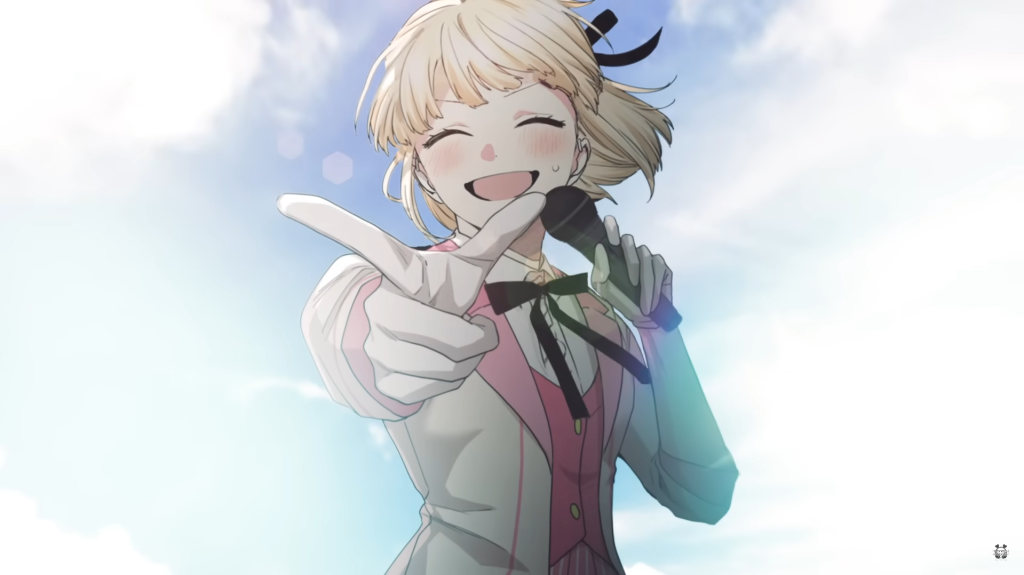
The main summer anime prospect that I’ve been looking forward to is Oshi no Ko S2. I’ve already talked a bit about Aka’s take on the “idol” world and that side of the entertainment medium on my Twitter. An entertainer’s constructed identity is not as simple as “genuine” or “disingenuous”, it can still be emotionally honest for lies to be born from a genuine desire to become a better person or to understand oneself. Ai was Aka’s take on this, that telling ourselves the same lie in the hopes that it becomes reality is honest, beautiful, and in a way, even more so than just simply telling the truth. If it isn’t clear, I liked Oshi no Ko’s first episode, but it seems like Aka had a lot more in store for what’s come after, with Oshi no Ko’s first season becoming an interesting mix of mystery, drama, and exploration of various aspects of the entertainment industry. I’m honestly not too sure where it’s exactly going to take all these ideas, but I do know that Aka does great work. At first, I liked Kaguya but didn’t think it was particularly special, but it grew to be a phenomenal story with cathartic emotional peaks and gave a sense of “home” with it’s lovably dorky cast that very few works can compare to.
The actual Lala Lai/Tokyo Blade scenes have mainly just been for moving the story along so far, but I did find its depiction of creator/interpretation dynamics to feel real. I’m an extremely idealistic person and I hold every work I make very dear to me, so even if I were to have the opportunity to be able to work with others in writing or have certain things be adapted, I’d be hard pressed to not try and understand things to the point where I’d be completely comfortable with the result. I guess I might be a bit similar to Abiko sensei in this regard, where I’d be very protective of my work if it were to be adapted in a way that seemingly invalidates my intentions. But, as the show portrays it, it’s really not that simple. Goa’s not a malicious guy, and he was honest, upfront, and honestly had a lot of good points on why he made the adaptation changes that he made. It’s not his fault, and while Abiko sensei immaturely undermines Goa’s efforts, it’s easy to understand why she’d be mad. It’s a compelling conflict to introduce, and I’m interested to see where Aka wants to take it.
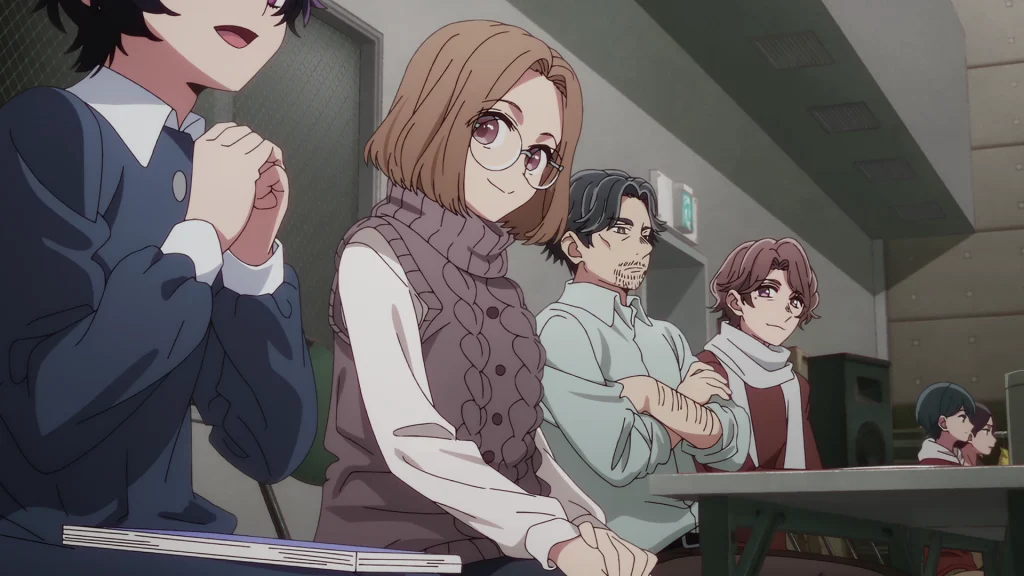
So, I haven’t actually seen the newest season of Monogatari (Off & Monster Season) because I’m not actually caught up. The last season I had watched was the first season of Owarimonogatari, and when S2 of Owari aired, I had already started moving away from watching seasonal anime. So, I just never got around to watching it. With Off & Monster Season airing, I thought it’d be nice to revisit this wonderful series. And so, I watched all of Owarimonogatari 2nd Season.
Monogatari has always been an odd series to me. I’d never actually fully understood why it has the popularity it does, and not because I think it’s bad, I actually think it’s pretty great and possibly one of the best anime series out there. It digs into its characters and people in ways that I rarely see in other works but I just wouldn’t think that its particular artistic priorities or execution would be ones that many others find appealing. Nisio Isin’s writing is, in a way, something that I’d describe as confidently self-indulgent. He writes with seemingly little regard for general writing conventions or norms, and the end result is something that’s almost masterfully “Nisio Isin”. It’s like if you were to see a character in a story try to greet another by groping them, but then these characters in the next scene talk about what they had for breakfast in ways that vaguely and insightfully tells of their home life and possible insecurities, you would think “yeah okay, this is definitely Nisio Isin” and wouldn’t bat an eye. He’s unabashedly himself when he writes and that’s something that I can really appreciate about the Monogatari series.
Owari S2 is the supposed “conclusion” of the Monogatari series, and while I can clearly see from subsequent seasons that there are still stories to be told in this world, that this is to be the end of Araragi’s time in the spotlight. I wasn’t entirely sure how they’d wrap everything up, but it seems like my fears were unfounded as Owari S2 ended Araragi’s story in what retrospectively was maybe the only way it could have: with Araragi coming face to face with the end of his adolescence and ultimately himself. Owari S2’s ultimatum to Araragi was a long time coming, and one that ultimately brings his story to a legitimately satisfying conclusion. Araragi’s always been one to save others, but in a way that always looked past himself. Self-sacrifice can be seen as a form of kindness, but we can ultimately only give what we can spare after giving first to ourselves. Giving more than what we can spare and what we give to ourselves only leads to disappointment, self-hate, and renders us in a worse position to give to others.
Owari S2 ultimately affirms that it’s okay to love ourselves, to give to ourselves what we desperately try to give to others. We all have our own demons that we’re fighting and although we can get the push we need from friends, we’re the ones that ultimately understand and save ourselves.
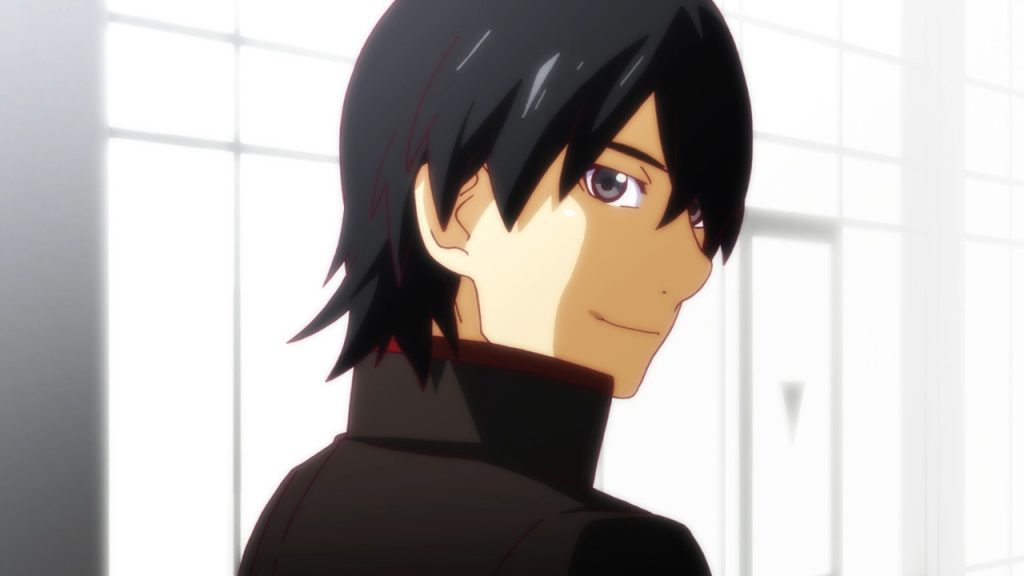
I continued my journey through Steven Universe, making my way to what Prime video has labeled the the end of the 5th season out of 7, but from what I can see online, Steven Universe actually only has 5 seasons and some website just order their episodes/seasons weirdly. So uh, let’s just say I’m nearing the climax as the series slowly builds up to its conflict with home world and the diamonds.
As the story builds to its eventual reckoning with the home world gems, Steven Universe’s characters are also coming face to face with their own difficult circumstances and problems. Through both its continuity heavy arcs and its familiar episodic structure, Steven Universe continues to soar emotionally by proving time and time again that it truly understands, empathizes with, and believes in its characters. The Crystal Gems’ internal and interpersonal struggles never feel dishonest or forced and is always composed with a world-hardened yet warm hand. From Amethyst’s circumstances of birth, to Pearl’s acceptance of Rose’s passing, to Steven’s continued realization of the world’s hardships, the show builds upon every experience
At this point in the story, the Crystal Gems (and the Crystal Temps) feel like a genuinely warm and familiar family that I can’t help but root for. Creating a sense of “home” within a group or community is a craft, and it’s one of the most powerful ways to tell a story. It’s one of the main reasons why I like Trails and Negima so much and why they’re among my favorite pieces of media ever. When I’m able to feel at home with and genuinely care for the characters, becoming invested in everything else is just a natural result.
My favorite episode in particular in the mid-season was the one where Connie and Steven were practicing fusion training with Pearl, and they were able to get glimpses into each others’ emotional states and thoughts as a result. Even someone as emotionally kind and resilient as Steven can falter from the weight of his emotions and struggles and when face to face with his emotions, it was Connie that was able to tell Steven that it’s okay to feel that things are not okay, that it’s only when we can accept our pain that we’re able to come to terms with things. It’s something I’ve come to learn recently myself, and I’m glad that Steven Universe has the insight and empathy to be able to convey those experiences.
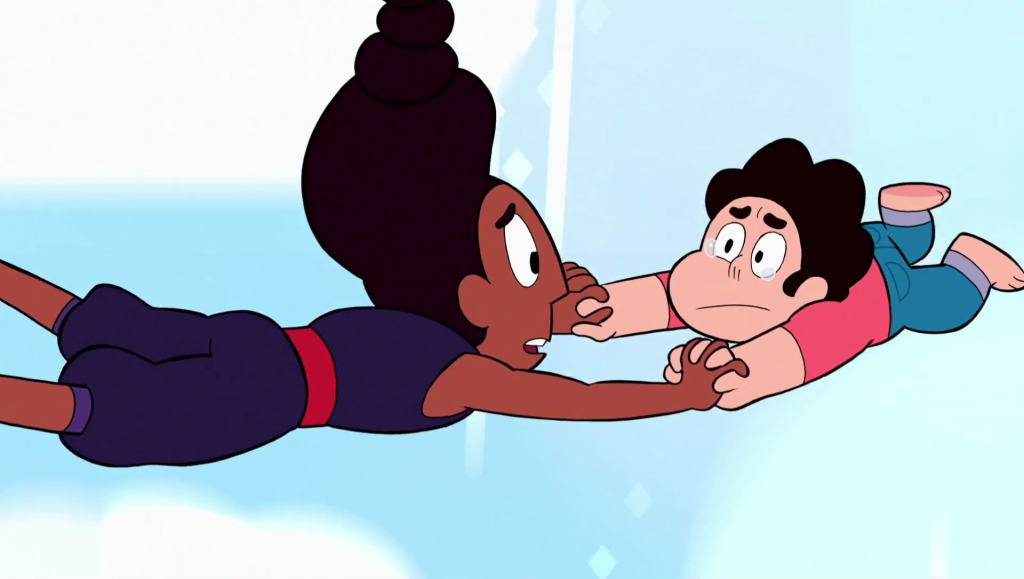
My hunt for emotionally resonant films brought me to Good Will Hunting, a 1997 film about an emotionally troubled genius who gets recognized for his talents and is made to work alongside a math professor and seek treatment from a therapist in exchange for leniency from jailtime. The “genius” part of the story wasn’t actually the most important emotional component– in fact, I thought the film’s portrayal of Will’s (the main character) genius tended to be bit hamstrung and overdramatized at times. If anything it did contribute to selling Will’s isolation as one of the many things that made him push others away, so there’s that.
That’s really what I cared and what struck me the most about this film, Will’s portrayal as a young, troubled kid who tries to get by in an unkind world. Unkind might not be entirely true, there are many people in his life who care about him, and not in a self-interested “I want what’s best for him but only if it doesn’t sub-consciously or intentionally hurt me” way like it is in many cases. There are people like Sean, Skylar, and his brothers that look out for him. But even with there being kind people in his life, I can truly, deeply understand Will’s reluctance and fear in breaking down his walls.
The world isn’t always an accepting place, and there are plenty of people out there that will reject Will because of his past and current actions. But, there are also those who’d try to understand and maybe even accept those things, even if what they’re shown is ugly and hurtful. Sean said it the best, that it’s not Will’s fault that things are difficult and that he does hurtful things. Being broken or messy doesn’t mean that one is undeserving of love. And no matter how broken someone is, it’s never too late to take a hold of your future. Good Will Hunting is a wonderfully earnest and empathetic film, and one that I’m sure has given many a bit of solace in self-acceptance.
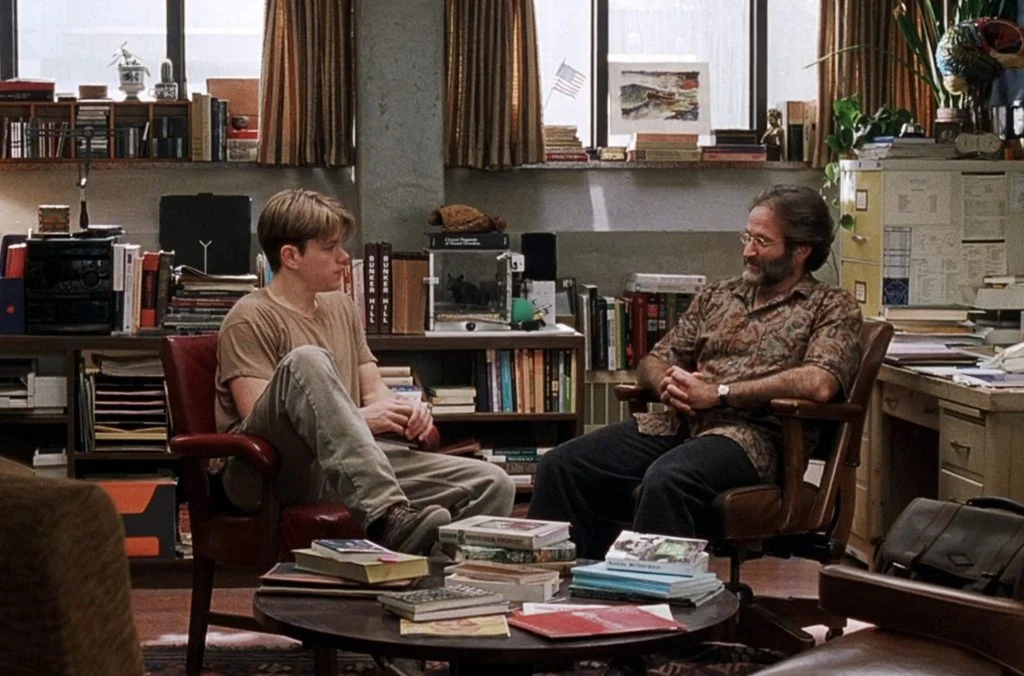
Also in my hunt for emotionally resonant films, and something I’d watched at the start of the month, was my viewing of Aftersun. I could best describe this film as quiet and almost… delicate? in a way. It’s subtle but purposeful in the way that it tells its story, with its phenomenal direction lending itself an almost perfect “capturing” of the story’s perspective. The film is told from the memories and old recordings of a daughter who went on a trip with her father when she was eleven, before the weight of adulthood catches up with either of them.
Aftersun is a lot of things. It’s a piercing but tender recollection of the past faced with present grief, it’s an exploration of Sophie’s feelings and difficulty in reconciling with what she didn’t know about her father, it’s a haunting portrayal of self-hate and depression, and so much more. It was as pristine and delicate as it was devastating, with hundreds of subtleties working together to create a stunning film.
It’s a bit odd to realize this, but Aftersun’s almost “distant” framing of the father actually made it more difficult for me to become as personally invested in him as a person. Which, makes sense in context and is likely intentionally framed that way. I don’t actually know much about the father, but I was left wanting to know. In that way, the film didn’t hit as hard purely as an emotional experience for me, but still leaves me continuously appreciating its directional work. Which, is a great place to be.
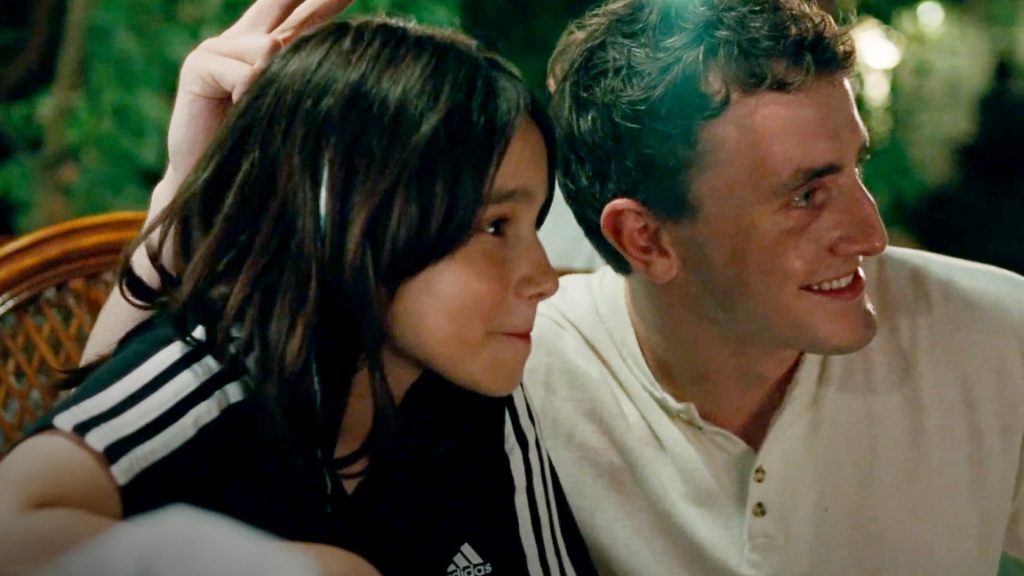
As mentioned in one of my Tweets, I’ve been wanting to dip my toes into different mediums, which somehow brought me back to Kdramas. I say “back” to Kdramas, but my experience with watching them is pretty sparse, having only checked out a few shows back in my time in middle school. I’ve never particularly been a fan of some of the tendencies for Kdramas to overdramatize or prioritize certain common plot and character threads at the expense of its characters or personal relatability. They always seemed forced or unnatural in the ways that they framed its writing, the characters were written more to fill a role or serve a purpose rather than being actual people, and the stories could never quite break out of their shell of self-fulfillment and superficiality. But, I know that every Kdrama wasn’t like that and that I’d barely scratched the surface of the medium, so I wanted to search for one that might speak to me.
Kdramas at this point in my life are interesting to look at for me. I’ve never quite fully been in touch with my own Korean heritage, and if you were to ask me how I felt about it 5-10 years ago, I’d have told you that its social values tended to stifle individual expression in favor of rigid and almost narrow-minded conformity to what the culture sees as “right”. While a lot aspects of the culture still don’t personally resonate with me, I’m old enough to see now that it’s a bit more complicated than that, that the heart and strength that lies in human expression tends to bloom even across cultures that see things differently. But anyway, I started checking out a few and there was one that immediately stuck out to me and I’ve been trucking through, My Liberation Notes.
My Liberation Notes just simply feels real, in many of the ways that characterize my favorite works. It portrays the lived experiences and struggles of a Korean family (and neighbor) living in a village many train stops from Seoul, Korea. The show weaves many different perspectives, giving us a view into the day-to-day of each of the characters, never once hesitating to slow things down. Everyday scenes such as eating around a dinner table and quietly eating is commonplace, and there are many conversations that might not seem integral to the plot but are crucial for portraying the experience of just simply existing in a scene that might be taken from a random page of these characters’ lives. Pages that aren’t necessarily exciting life changing events, but rather are the “cracks” in our lives, the ones that we tend to forget but often characterize the majority of life.
My Liberation Notes’ depiction of its characters aren’t what most Kdramas frame as gifted or desirable. They aren’t rich, they aren’t geniuses, and while they’re all played by attractive actors and actresses, the show never warps the perception of the side cast to center around them. All of them struggle with things that many might find relatable, such as a failed relationship, debt, a long commute, abrasive coworker, a hot summer day, and just simply, the weight of their emotions and experiences.
While there have been a few scenes of “Kdrama-ness” that have made me a bit skeptical, those scenes are few and far between and the vast majority of the show is populated by brilliantly written scenes that feel natural and real. It does, in a way, make me feel a bit nostalgic watching this. I’ve long since stepped away from the household I grew up in to pursue my own life, and seeing scenes that feature the Korean family dynamic reminds me of the time I spent at home growing up. It’s scenes like the ones that portray the frustration of trying to change an old Korean parents’ mind followed by the off-hand warmth of making sure you don’t miss a meal that sells it for me.
There’s still quite a bit of the show left, with me having watched episodes 1-5 as of my writing this. I’m not too sure exactly where this show will go with its story, but as of right now, My Liberation Notes is a rare gift.
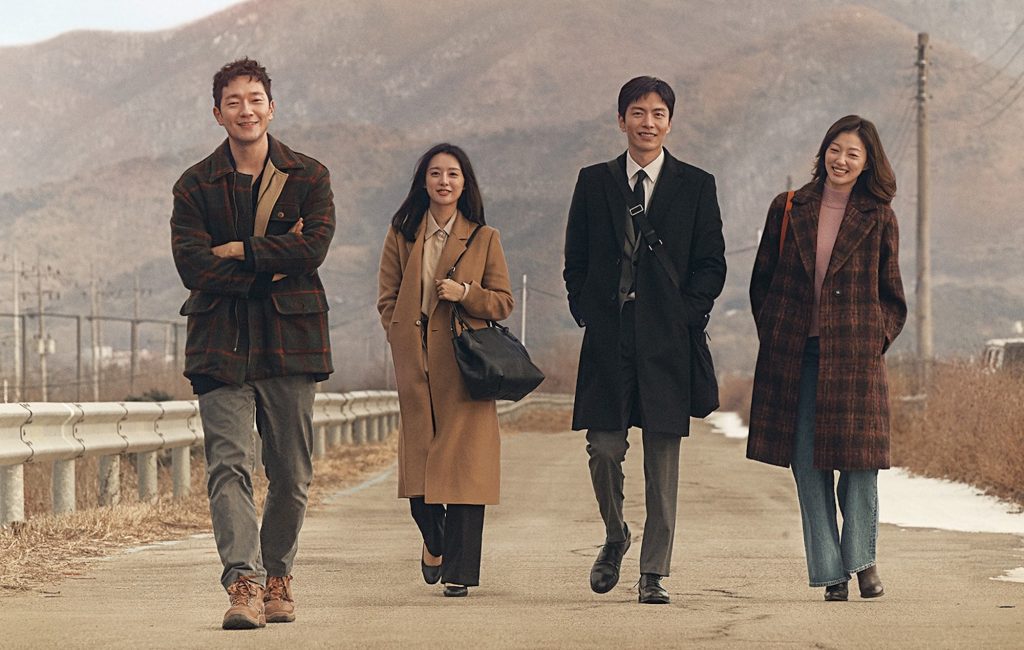
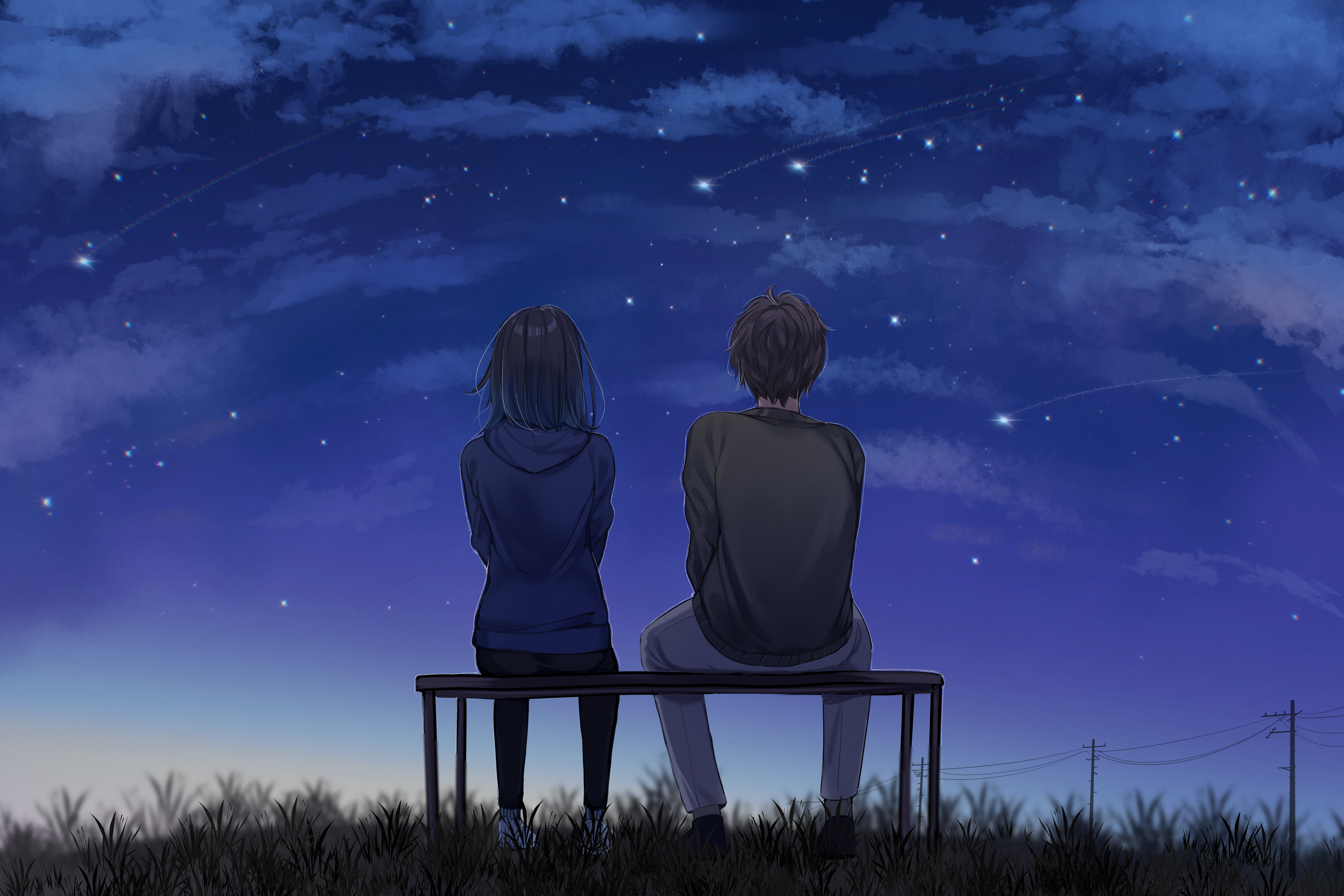
Leave a Reply